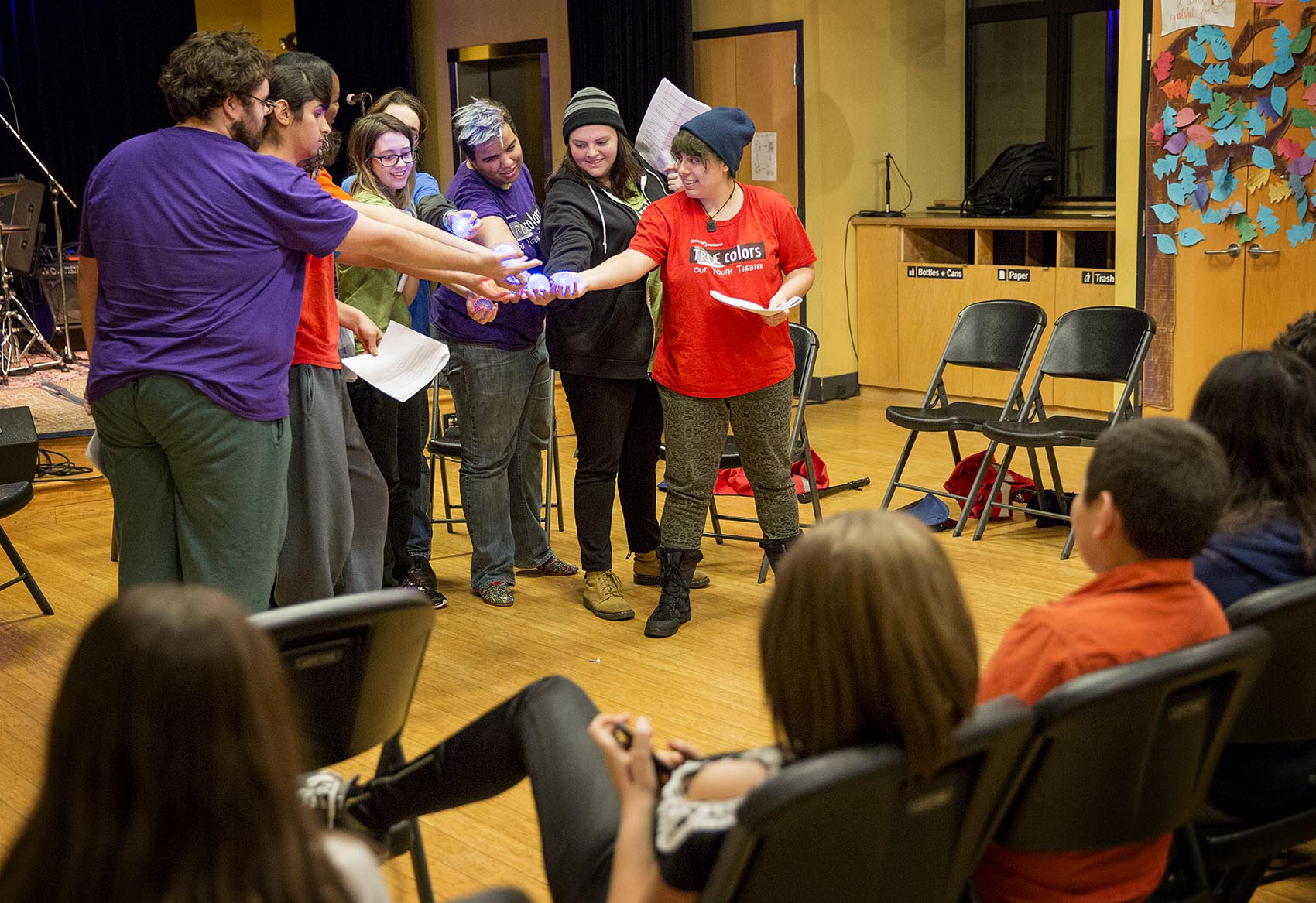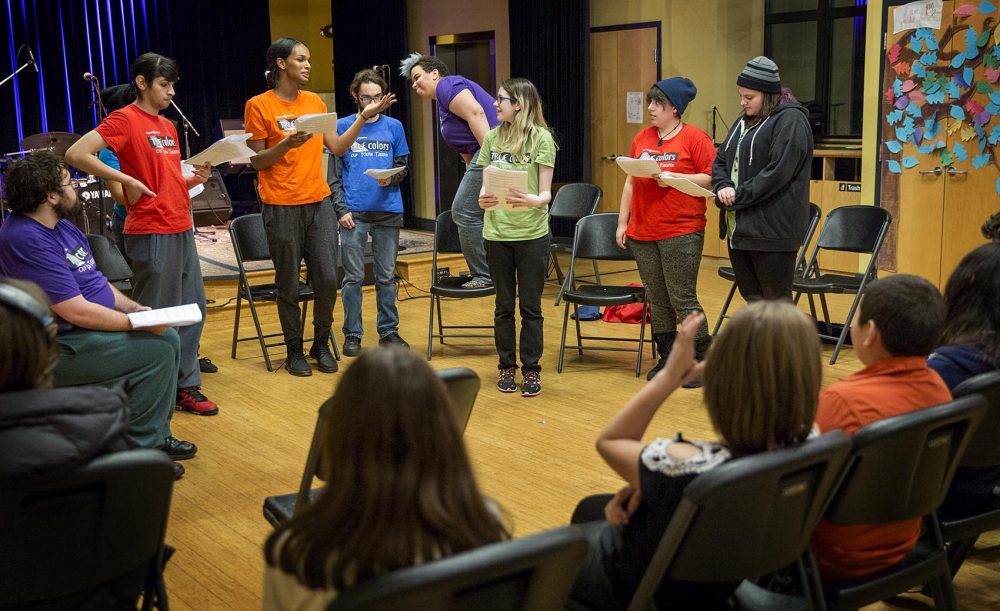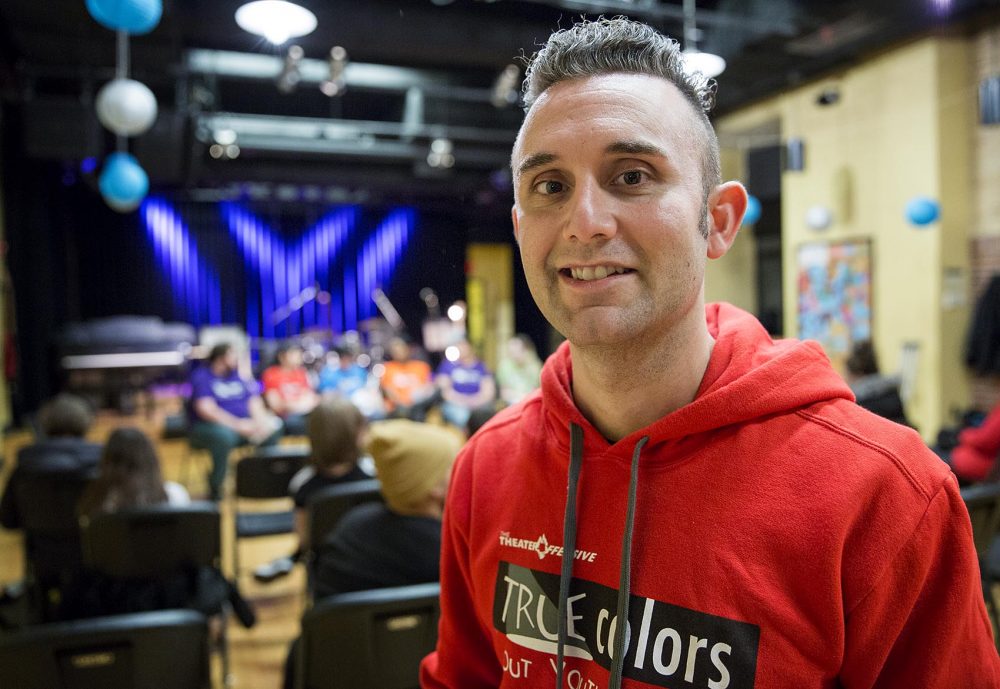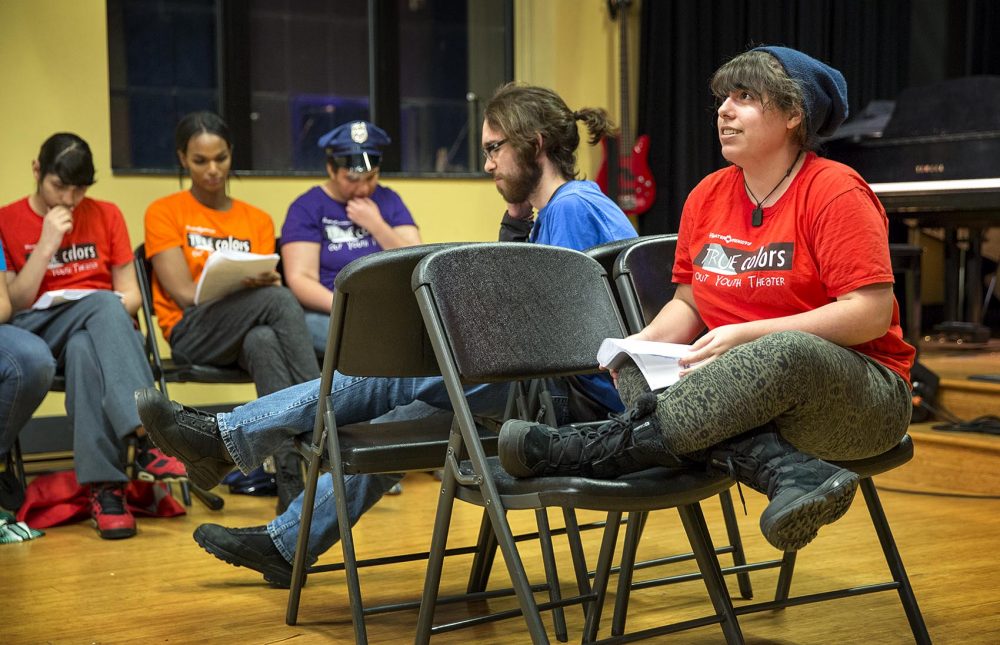Advertisement
In True Colors Theater Troupe, Boston's LGBT Youth Speak Their Truth
Resume
Acting is about adopting a new identity, but performers often have to tap into their own experience when taking on a role.
That idea is at the heart of Boston-based theater troupe True Colors, which uses theater to empower LGBT youth. The group became the first LGBT organization to win the National Arts and Humanities Youth Program Award in a ceremony at the White House last month.
On a recent December evening, the troupe gathered onstage in the airy performance space at Zumix, an East Boston arts nonprofit. The staged reading was a casual affair — no curtains, no lighting cues — really just a chance for the actors to get feedback on their script, which they will edit and perform in the spring.
Jasper Torres Charpentier, of Jamaica Plain, darts across the stage. “They’re coming after everyone,” the 18-year-old says breathlessly. “I just managed to slip away, but they got someone I know.”
The play, a sci-fi adventure called “Out in Space,” takes place in a dystopian future, and LGBT citizens are fleeing an oppressive government regime. It is also a vehicle for members of the cast to share personal stories. In between lines about running from the police and plotting escape on a spaceship are more personal vignettes based on the actors’ own experiences.

Hasana Guzman Soto, of Roslindale, performs a scene about street harassment.
“Well, back when I started my transition, I couldn’t go outside without being harassed," the 19-year-old says, standing tall in the middle of the stage, script in hand. "It didn’t matter what I did — even if I didn’t wear makeup, I was still harassed, especially when taking public transportation.”
Guzman Soto identifies as gender non-conforming, and uses the pronouns “they” and “them.” In True Colors, they are able to address that history of harassment and the feelings of self-consciousness that come along with it — all onstage, in public.
“That space was necessary for me to be able to feel comfortable and actually be myself,” Guzman Soto says. “Because I feel without the space, I would still — I don't know -- like I wouldn't be me. ‘Cause it actually helped me not care what other people had to say that didn't have my best interests in mind.”
True Colors director Nick Bazo says that “writing the plays can be cathartic in many ways — talking about something that maybe they've never been able to talk about before.”
Bazo has been directing True Colors for six years. “Performing is empowering because it gives you an opportunity to speak,” he says. “It fundamentally, it gives you an opportunity to stand up, and say your story in a way that people may not have been willing or wanting to hear it, or have asked you to tell it.”

For 18-year-old Trae Weekes, of Dorchester, that moment in the spotlight was transformative.
“I had always tried to tell myself that I was outgoing, always, but I had a lot of stuff that I had internalized, and that I hadn’t shown outside and hadn’t let people see, or show,” she says. Her time with True Colors helped her come out to her family as a lesbian.
“I didn’t want have to always switch codes when I was around my family. I just wanted to be who I was," she says. "And True Colors gave me the confidence to do that, and the understanding of myself to be like, ‘This is who I am, I love who I love, I can’t help that, but I can have people — I can have a community that can help me understand that within myself.’ ”
True Colors was founded in 1994. Evelyn Francis, director of programs at True Colors’ parent organization The Theater Offensive, says that when she started working there 16 years ago, she struggled to find places for True Colors to perform.
“A lot of school secretaries hung up on me,” Francis recalls. “There was absolutely zero chance that True Colors was going to perform in their schools, or that their young people would be told about the program and the opportunity to participate. So it was a very, very difficult battle.”
But True Colors persevered, driven by the belief that theater is an ideal tool for empowering LGBT youth and educating audiences. Francis says that since then, things have improved. The troupe started out with just a handful of participants, but now demand is overwhelming; Francis estimates that True Colors and its auxiliary programs serve up to 150 youth a year. Kids are coming out younger, and more parents are on board. Members of the troupe actually get paid to perform.
But the process isn’t always easy. The troupe spends as much time editing as it does writing, and that means critiquing each other’s stories — and taking criticism.

“I’m very, like, closed off about personal things. You got to achieve level-eight friendship to unlock my tragic backstory,” says Torres Charpentier, who is gender non-conforming. Sharing their story didn’t come easily.
“It can be hard to be, like, vulnerable with a group of people, because obviously we’re not going to get along all the time. People clash, ‘cause you’re together for several hours in a week, working on personal things,” Torres Charpentier explains. “And if someone comments on something that you’re sharing, it can be offensive. I don’t know — it’s empowering to be able to share these stories, and just to see people’s reactions and hear people’s reactions, even if they’re not always positive.”
Opening up in front of an audience carries even greater risk. What if people don’t relate to your story? What if they walk out? It’s not an idle fear — incidents like this have happened. But Francis says the risk is necessary. The whole project hinges on the players’ willingness to reveal themselves onstage.
“In this case, there are real stories and so when you're watching someone suffer, I think you can’t help but feel a sense of empathy for that person — unless you’re just shutting something off, there’s some other barrier,” Francis says. “But I feel like the more people hear personal stories and struggle, and understand their own struggle, the more that we can chip away at those barriers.”
At the staged reading of “Out in Space,” that sense of possibility was palpable. The show ended with all of the characters on a spaceship, ready to blast off into the unknown. A tinny voice counted down over the loudspeaker, and the sounds of an engine whooshed. Then the actors, happy and relieved, took their bows.
For some members of True Colors, the spaceship probably represented an escape: from struggle, from worry, from fear. But more than that, it stood for freedom — and for a future of their own making.
This segment aired on December 23, 2016.
